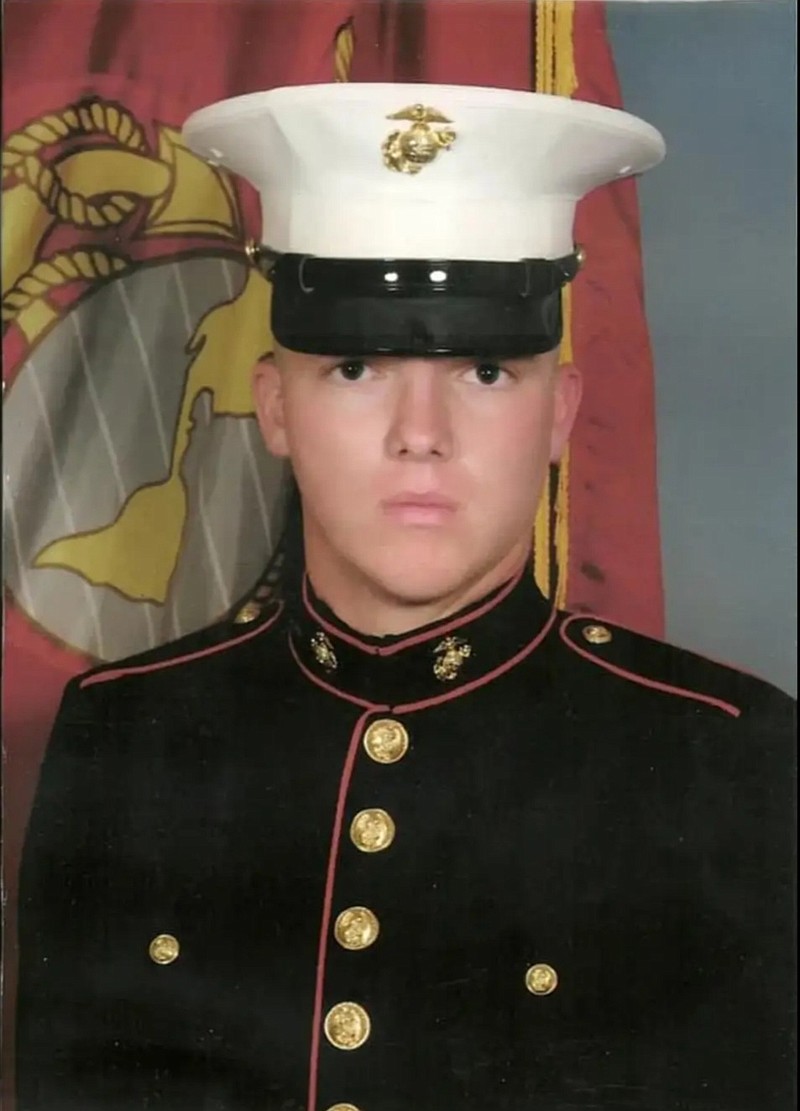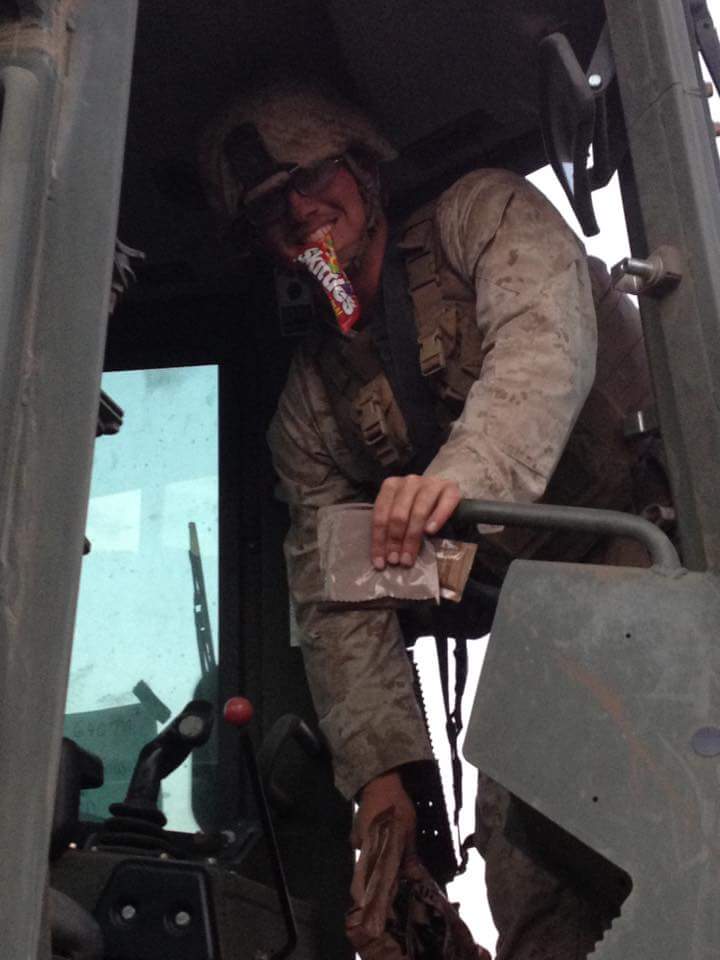Morgan Jones always knew he wanted to join the military.
The Marine Corps veteran said he decided early on that he would join up after hearing his grandfather Gene's stories about his time serving during the Vietnam War. Then the attack on the Twin Towers on Sept. 11, 2001, when Jones was a fifth-grader at Washington Middle School, sealed the deal.
"I saw the planes hit the towers. Kind of cliché as it sounds, I wanted to do what I thought I was supposed to be doing," Jones said.
A 2010 graduate of Strong High School, Jones joined the service quickly after graduation. He chose the Marine Corps over other branches for the challenge.
"It seemed like a good way to go out of high school," Jones said. "My grandpa and all his brothers served in Vietnam, and he was a big influence in my life, so I went down that path."
He knew he wanted to be an engineer of some kind, and ultimately became a heavy equipment operator, handling machinery like bulldozers, forklifts, backhoes – "you name it."
"I grew up around heavy equipment, so I kind of already knew what I was doing," Jones said. "So I was in charge of the machinery, so if they needed a front-end loader, a bulldozer, a backhoe, you name it, any sort of thing like that, I was the guy who came to and handled up on that stuff."
Jones' first duty station was in Okinawa, Japan, where he made his first trip out of the country. He returned stateside for work in Hawaii with the 2nd Battalion 3rd Marines before heading to California for "Mojave Viper" training with the 3rd Battalion 8th Marines.
"All the Marines have to go on what's called 'Mojave Viper' in the Mojave Desert, California. That's basically preparing you to go to Afghanistan, you do a bunch of different things kind of just learning," Jones said.
In 2012, he deployed to Afghanistan for a seven-month tour, where he worked at Forward Operating Base (FOB) Geronimo, in the Helmand Province in the southern part of the country. There, his unit worked in support of the 3rd Battalion 8th Marines, "the infantry battalion on the ground," he said.
"So anything they needed, we would deliver – food, water. We built base defenses. That sort of stuff," Jones said.
Jones' granddad was of course proud of him for joining up, even going so far as to travel to California with his wife and Jones' parents to see his grandson graduate from boot camp. His mother was also proud, but nervous, as any mom would be.
"She knew I was going to do it, and she knew she wasn't going to stop me. She was very supportive, but also afraid at the same time," he said. "I was the guy always getting, like, a huge care package with all kinds of stuff, and that transferred into me giving everybody stuff, so they loved it. She would not only send stuff for me, she would send stuff for the whole platoon. She was very much a mom in that scenario."
But the overall purpose of the mission was preparing for the eventual withdrawal of U.S. troops from Afghanistan, Jones explained.
"We tore down a couple of patrol bases, turned stuff over to the Afghans, things like that. We were told we were there for the draw down," Jones said. "We probably tore down more than we built... I actually went out a few times and was in charge of training the Afghan National Army, their equipment operators. We worked close with them – like really close – teaching them how to build patrol bases and that sort of stuff."
The work was still dangerous. At one point while Jones was overseas, an insider attack at a nearby base left a handful of Marines dead.
"We had a couple of – well, I wouldn't say incidents; we had a couple of tight spots. When I was there, Camp Leatherneck (a nearby U.S. Marines base) was attacked from the inside out, kind of an insurgency thing. I wasn't there... but we unfortunately lost some guys there," Jones said. "That happened, stuff like that. A couple of our convoys were hit by explosives. One of our guys was injured, but he survived, he's actually a paramedic now in San Antonio."
"At the time, we didn't really think of it as dangerous, but it definitely was kind of dangerous. Someone's actually trying to kill you while you're there," he continued.
Seven months after he arrived, Corporal Jones left Afghanistan and came home. He returned to Camp Pendleton in California, where he worked with the 7th Engineer Support Battalion through 2014.
"You get out of it what you put into it," Jone said, adding that morale went up and down during his time in the service. "It was pretty much what I expected it to be. Nobody joins the Marines thinking it's going to be a cakewalk."
Once he left the service, Jones came back to Union County. He tried college while also running a press at Del-Tin Fiber. But he found his true calling in 2016, when he joined the El Dorado Fire Department.
"A lot of guys, when they come back, have a hard time fitting in because other guys their age haven't had their experience. So, like, it's difficult – you grow up a little bit faster when someone's trying to kill you. I felt like when I went to the fire department, it helped me in that way, because a lot of the guys have similar experiences," Jones said. "It's a similar mindset. It definitely helped me... That's why you see a lot of us go to fire departments, police departments."
Jones is an EMT and a member of the EFD's rope rescue and HAZMAT (hazardous materials) response teams. When he sat down for an interview with the News-Times, he'd just finished a day of rappelling as part of a training exercise at Delek.
"We were just doing a rope rescue technician class... Say someone unfortunately gets injured down there in a tight spot, we can go down there and put them in a stokes basket and raise them back up out of wherever they were at. There's a bunch of different applications," Jones said. "I spent basically all week rappelling off of stuff. That's a fun thing to do."
Working at the EFD gives Jones the chance to build on what he learned in the military, he said, and while the job is different, it's fulfilling in similar ways. When he joined the fire service, he fit right in, he said.
"It's a paramilitary organization and I pretty much fit in like a glove there. I love doing it," he said. "I've served my country before; now it pretty much just makes sense to serve my community. It makes me feel like I'm doing something with my life."
In late October, Jones didn't have plans made for Veteran's Day; most likely he'll be spending it with his wife, Lilli, while she's home from her job as a traveling nurse, and their five cats and two dogs.
Jones said for him, the most important military holiday is Memorial Day. Looking back at his service, he thinks of those who paid the ultimate price as he continues his life.
"The best I can say is live your life in a way that honors those guys who didn't come back," he said. "Live a full life. Live a life that they don't get to live."

